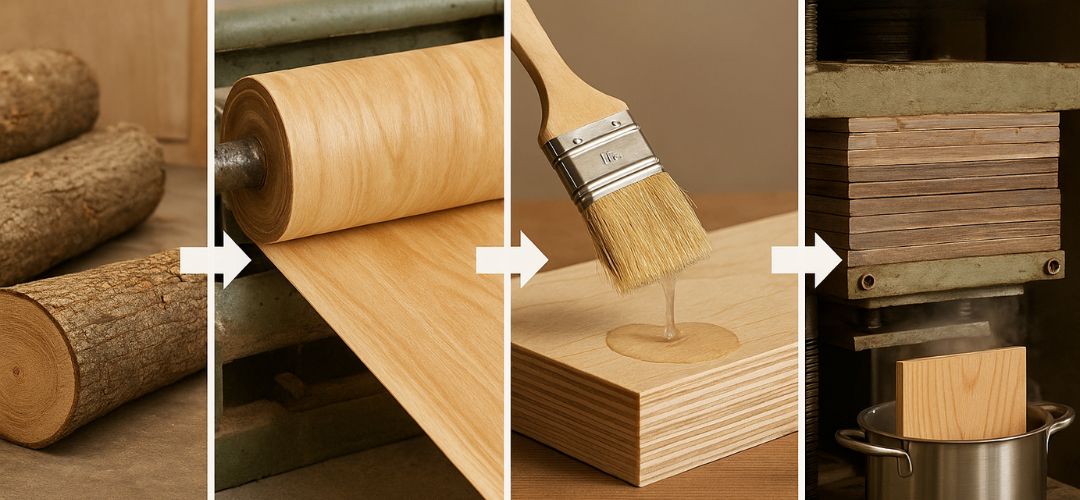Introduction: Why BWP Plywood Matters
You've probably heard about BWP plywood if you're building bathroom vanities, modular kitchens, or any furniture that may be exposed to heat, moisture, or moisture.
However, what exactly makes Boiling Waterproof Plywood impervious to deterioration and water?
At Plyneer Industries, we think it's important to inform experts and consumers about the ingredients in our plywood and why it works better.
To help you make wise choices for your upcoming residential or business project, let's examine the science and procedure underlying BWP plywood.
What is Plywood BWP?
Boiling Waterproof, or BWP for short, is a type of plywood that can endure up to 72 hours in boiling water without delaminating, swellin', or losing its strength.
This kind of plywood is perfect for wet areas, outdoor furniture, baths, and kitchens since it complies with IS:710, the Indian Standard for waterproof plywood.
The Manufacturing Process: How BWP Is Made
BWP plywood at Plyneer is about precision engineering, not only resistance. What goes into creating it is as follows:
1. The Hardwood Selection
High-density hardwoods with inherent strength and durability, such as eucalyptus or gurjan, are where we start. They are:
- Sourced responsibly
- seasoned to balance the moisture content
- separated into homogeneous veneers
🌱 Why it matters: Only thick hardwood can guarantee long-term structural integrity and mechanical strength.
2. PF Resin, also known as Phenol Formaldehyde Resin
While BWP plywood employs phenol formaldehyde (PF) resin, MR and BWR plywood might use urea-based adhesives. It is:
- Waterproof that boils
- Termite and weather resistant
- Complies with IS:848 adhesive requirements.
🔬 This resin creates chemical linkages that are genuinely waterproof, even when boiled for extended periods of time.
3. Core Veneer Treatment
Each core veneer is treated with the following prior to assembly:
- Borer and termite repellents
- Fire retardants and preservatives (optional)
- Regulated drying to achieve the correct moisture content
🛡️ This step guarantees complete protection against bugs and fungal deterioration.
4. Hot Pressing at High Temperature & Pressure
PF resin is used to join the core and face veneers, which are then hot-pressed at temperatures between 140 and 150°C under high pressure. This causes:
- Deep penetration of resin
- Strength of cross-bonding
- Uniform curing of resin
Consider it as "baking" the plywood to give it structural integrity.
5. Calibration and Sanding
After pressing:
-
The board is adjusted to attain consistent thickness.
-
For a smooth finish, wide-belt machines are then used to sand it.
-
Lastly, it is cut to exact measurements (8x4, 7x4, etc.).
The outcome? a flawlessly smooth, splinter-free plywood sheet that is prepared for veneer or laminate.
Real-Life Water Resistance Test
IS:710 states that BWP plywood needs to pass:
- Test of boiling water for 72 hours at 100°C
- No warping, delamination, or failure of the adhesive
- Tests for water absorption and bond strength
To ensure quality, Plyneer tests each batch of its BWP boards internally.
Where is BWP Used?
|
Application |
Why BWP Works Best |
|
Modular Kitchens |
Water, steam, and heat resistance |
|
Bathroom Vanities |
Handles humidity and wet wipes |
|
Exterior Furniture |
Tolerates rain and sun exposure |
|
Laundry/Utility Areas |
Strong Under sink usage and water spill |
|
Balconies/Partitions |
Weather-resistant and anti termite |
Plyneer Pro Tip: Look for ISI Mark
Only ISI:710 certified plywood is truly BWP grade. Plyneer proudly stamps each sheet with this mark to assure you of:
- Certified waterproof performance
- Consistent quality
-
Premium raw materials
Conclusion: It’s Science, Not Just Marketing
BWP plywood isn’t just “better plywood.” It’s the result of:
- Premium wood selection
- Waterproof PF resin
- Chemical treatment
- Scientific pressing and testing
When you choose Plyneer BWP plywood, you’re choosing a product engineered for real-life Indian conditions—where kitchens are hot, bathrooms are humid, and durability is everything.








